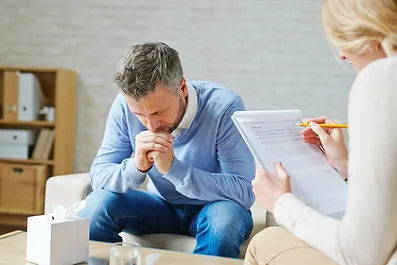Depression and anxiety are common mental health challenges that can affect anyone, regardless of age, gender, or background. Recognizing the early signs of these conditions is a crucial step in seeking help and support.
In this blog post, we’ll explore the early warning signs of depression and anxiety, shedding light on how to identify them in yourself or others and emphasizing the importance of early intervention for mental well-being.
Understanding Depression and Anxiety
- Depression: Depression is characterized by persistent feelings of sadness, hopelessness, and a lack of interest or pleasure in activities that were once enjoyed. It can also manifest physically with symptoms like changes in appetite or sleep patterns, fatigue, and difficulty concentrating.
- Anxiety: Anxiety involves excessive worry, fear, or unease about future events or situations. Physical symptoms can include restlessness, muscle tension, irritability, and a racing heart.
Early Signs of Depression
- Persistent Sadness: Feeling persistently sad, empty, or down most days, even without an apparent reason.
- Loss of Interest: Losing interest in activities, hobbies, or social interactions that were previously enjoyable.
- Changes in Sleep: Experiencing changes in sleep patterns, such as insomnia (difficulty sleeping) or hypersomnia (excessive sleep).
- Changes in Appetite: Significant changes in appetite and weight, whether it’s increased or decreased.
- Fatigue: Feeling constantly fatigued or lacking energy, even after a full night’s sleep.
- Irritability: Becoming easily irritable, agitated, or having a low tolerance for frustration.
- Difficulty Concentrating: Struggling with concentration, memory, and decision-making.
- Feelings of Worthlessness: Experiencing feelings of guilt, worthlessness, or excessive self-criticism.
- Physical Symptoms: Experiencing unexplained physical symptoms, such as headaches or stomachaches.
- Social Withdrawal: Withdrawing from social interactions, including friends and family.
Early Signs of Anxiety
- Excessive Worry: Persistent and excessive worry about various aspects of life, including everyday concerns.
- Restlessness: Feeling restless or on edge, as if unable to relax.
- Irrational Fears: Experiencing intense fears or phobias, such as fear of specific situations or objects.
- Muscle Tension: Holding tension in muscles, leading to physical discomfort.
- Sleep Disturbances: Trouble falling asleep or staying asleep due to racing thoughts or anxiety.
- Difficulty Concentrating: Finding it challenging to focus or make decisions due to anxious thoughts.
- Physical Symptoms: Experiencing physical symptoms like a racing heart, shortness of breath, sweating, or trembling.
- Avoidance Behavior: Avoiding situations or places that trigger anxiety.
Seeking Help and Support
Recognizing early signs of depression and anxiety is the first step toward seeking help and support. It’s essential to remember that these conditions are treatable, and early intervention can lead to better outcomes. If you or someone you know is experiencing these symptoms, consider the following steps:
- Talk About It: Openly discuss your feelings with a trusted friend, family member, or mental health professional.
- Professional Help: Reach out to a mental health therapist or counselor for evaluation and guidance.
- Support Groups: Consider joining a support group where you can connect with others facing similar challenges.
- Lifestyle Changes: Engage in self-care practices, maintain a healthy lifestyle with regular exercise and a balanced diet, and prioritize sleep.
- Medication: In some cases, medication may be prescribed by a healthcare professional to manage symptoms.
Stay Informed: Educate yourself about depression and anxiety to better understand what you or your loved one is experiencing.
In Conclusion
Recognizing early signs of depression and anxiety is a critical step in promoting mental well-being and seeking help when needed. It’s important to remember that you don’t have to navigate these challenges alone. Reach out for support, and remember that treatment and support are available, offering hope for a brighter and healthier future.
Early recognition is key. Learn how to identify and address the early signs of depression and anxiety for a brighter future.

